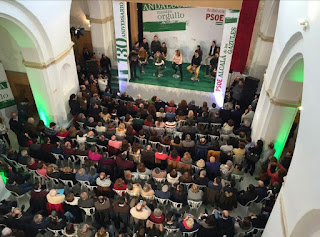130th anniversary of the PSOE in Alcalá - a view from the Left

In response to the event described in the previous post, here is a translation of a statement from the local assembly of the IU (Izquierda Unida - United Left). The original can be found on their Facebook page . This weekend in Alcalá de los Gazules there is a meeting of the leaders of the fractured Spanish Socialist Workers Party. On this date is celebrated the 130th anniversary of the short-lived – it was only active for two years – but important socialist group at the end of the 19th century; a collective of workers which, during its years of existence, developed a programme of education, agitation and awareness on behalf of the most needy. These Marxists and atheists fought belligerently against the exploitation, misery and hunger of their countrymen and women. It was one of numerous associations, many of them anarchist and longer-lasting, which fought against the injustices of a regime of despotism, privilege and repression. Alcalá was an undeniable example of the or...





